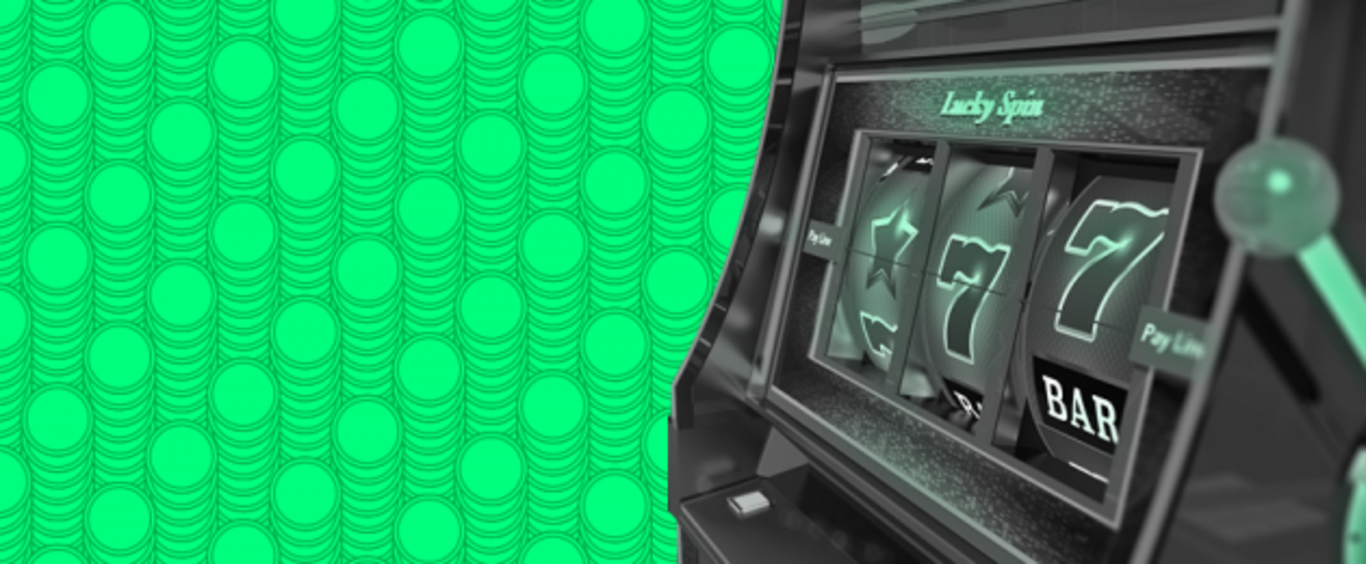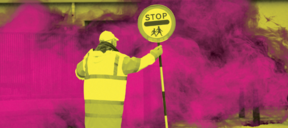'A licence to print money': The 'wild west' of Ireland's rampant slot machine industry
Despite a recent crackdown, gaming operators continue to openly flout bans in many parts of the country.

TENS OF THOUSANDS of illicit slot machines could be in use across Ireland as casino and gaming arcade operators openly flout rules that effectively ban the ‘one-armed bandits’ from many parts of the country.
And with little enforcement of laws surrounding licensing, stakes and prizes, the industry has been effectively left to trade at will as authorities sweat on long-awaited changes to outdated gambling laws.
One addiction expert described the machines as a “licence to print money” with no safeguards in place to shield problem gamblers, an issue likely to be exacerbated as the government pushes ahead with a 300-fold increase in the amount that can legally be spent on a single spin.
Despite a recent crackdown on the slot machine sector, Noteworthy – the investigative journalism platform from TheJournal.ie – has found:
- Casinos and gaming arcades in prominent locations continue to trade despite being legally barred from obtaining licences to operate;
- Punters routinely being lured with the offer of winnings thousands of times above those allowed under existing laws;
- In some cases, few checks in place to stop underage gambling in venues with little distinction between child-friendly amusement machines and adult-oriented casino operations.
Ireland’s addiction
Ireland’s punters are some of the world’s most enthusiastic gamblers, losing an average of €382 per adult in 2018, according to UK firm H2 Gambling Capital. That tally was behind only Finland among European states.
While the largest share of the money went online, more than 20% – or around €83 for the average adult – was lost on slot and gaming machines. Regular gamblers are estimated to account for about 80% of the total gambling losses per country.
In Ireland, each gaming machine is required to have a licence, of which there were 4,491 in effect at the beginning of this month, according to Revenue. These cost up to €505 for the annual version.

Some traders, particularly in coastal towns, opt for cheaper three-month licences to cover the peak summer season, however only 12,113 gaming machine licences were issued in 2018 and not all of these would have been in effect simultaneously.
Machines are only exempt from requiring licences if they are stored in locations that are inaccessible to the public.
The official figures are dwarfed by claims that there may be as many as 40,000 gaming machines in use across Ireland, according to estimates from the Licensed Gaming Association of Ireland (LGAI), which represents a small number of licensed operators.
That leaves open the possibility that more than 30,000 unlicensed or improperly licensed machines – those being run illegally under cheaper ‘amusement machine’ permits – are in action, although other industry figures say the likely figure is a fraction of this tally.
While many of these machines are located in high-street ‘casinos’ or seaside amusement arcades, they are also found in businesses like pubs – which are barred outright from obtaining gaming licences.
The Gaming and Leisure Association of Ireland (GLAI), which represents private members clubs, some of which also operate slot machines, earlier claimed there could be nearly 9,000 unlicensed machines operating in Ireland in addition to thousands more on improper amusement licences.
Together they could be costing the Exchequer up to €27.3 million each year in lost licence fee and VAT income, it added.
With 40,000 machines, Ireland would have the highest per-capita tally in Europe behind only the tiny principality of Monaco – and a ratio roughly on par with that in Australia, widely considered to be the world’s slot machine capital.
However unlike in Australia, where machines are generally required to pay out 85% of all stakes in winnings, gaming machines operate virtually unchecked in Ireland under the State’s 63-year-old gambling laws.
Casino or amusement arcade operators are not required to adhere to any responsible gambling laws, although many offer voluntary self-exclusion registers for individual punters.
Barry Grant, the CEO of Problem Gambling Ireland, said gaming machines were a “licence to print money” as operators were taking no risk for potentially large returns.
The whole sector is an absolute basket case in terms of the total absence of regulations, the total absence of enforcement of the legislation as it stands and the zero protections for vulnerable people,” he said.
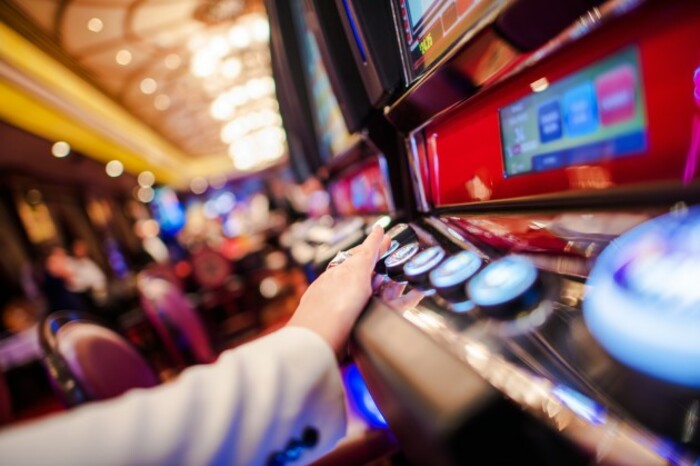
Local bans
In Ireland, the gambling industry is governed by the Gaming and Lotteries Act of 1956. Confusingly, the laws explicitly ban slot machines, only allowing for machines “designed for amusement” that pay back no more than the amount at stake.
The regulations do, however, allow for gaming licences to be issued to “amusement halls” as long as these venues also provide non-gaming entertainment.
Crucially, gaming licences could only be issued in areas where local authorities had adopted the relevant section, called ‘Part III’, of the laws – otherwise the activity would effectively remain banned in those counties or districts.
This led to a piecemeal approach across the country, with some councils never adopting the relevant laws, others approved gaming in only some areas and others clearing it outright.
The laws were partially updated in 1975, when the Finance Act allowed for the licensing of gaming machines.
These licences would only be issued by Revenue to licensed gaming operators, who under the earlier regulations had to first apply to the district court for a certificate that confirmed the relevant local authority had approved the activity.
The situation has been further complicated with the mergers of various local authorities and the abolition of borough and town councils, which may previously have been operating under different laws.
In Donegal, for example, gaming was legalised within the county council area in 1956 but this decision was rescinded in 1986.
It remains legal in Bundoran, where the urban council approved gaming in 1974, while councillors for the Letterkenny and Inishowen urban districts narrowly voted to permit gaming earlier this year.
For Dublin, which has become the flashpoint for controversy around the continued operation of numerous casinos and gaming arcades despite an effective local authority ban, the regulations were adopted in 1956 but rescinded in 1988.
When contacted by Noteworthy, several councils were unsure whether or not the laws had ever been adopted in their areas.
In many areas where gambling hasn’t been approved, casinos continue to do business as private members clubs, which fall into a legal grey area as their operators argue the premises aren’t open to the public and therefore fall outside the scope of existing rules.
Click here if you are having problems interacting with this map
There is little transparency under the current system with no publicly accessible registers of licence-holders, although operators are required to advertise their intention to apply for gaming certificates from the courts.
Revenue refused a Freedom of Information request for a list of gaming licence-holders citing rules around taxpayer confidentiality.
The 1956 Act also placed now-archaic limits on the maximum amount that could be put at stake on any game, restricting the sum to 6p per player – or around 3c in today’s money.
The maximum prizes on offer were also fixed at 10 shillings, or around 50c, however gaming machines routinely advertise potential payouts in the hundreds and thousands of euro.
The outdated regulations and the fragmented approach to enforcing existing laws has led to a “wild west sector”, according to Fianna Fáil TD Jack Chambers, who has been vocal on the need to overhaul the industry.
There’s a consensus that there’s a need to update our rules and introduce a regulator, but the existing laws should be applied. Because if they’re not, it gives free rein to everyone within the sector to stretch the breaking of the laws as far as they can,” he said.
 One machine advertising a jackpot of more than €10,000
One machine advertising a jackpot of more than €10,000
Unpoliced
For years there appears to have been only sporadic policing of the industry. The lack of governance is most visible in Dublin, where gaming businesses appear to have operated with virtual impunity in the face of the 30-year-old council ban.
That changed two years ago, when Revenue launched an ongoing ‘compliance project’ for the sector leading to the seizure of 347 illicit gaming machines – although this is only a fraction of the unlicensed machines widely believed to be in operation.
When asked by Noteworthy for details of previous gaming machine seizures or casino inspections, Revenue said figures on these actions for previous years were “not readily available”.
However in a February response to a parliamentary question, Finance Minister Paschal Donohoe confirmed that zero gaming machines had been seized in either 2016 or 2017.
Revenue did not respond directly to Noteworthy’s questions on whether it had conducted any previous projects targeting unlicensed machines, or how casinos had been able to operate in apparent breach of the licensing laws for years.
A spokeswoman noted that the agency was “not a statutory regulator for the gaming and amusement sector”.
In internal documents circulated earlier this year, Revenue hailed the compliance project as a success due to the “uptake in licensing since the project’s initiation”.
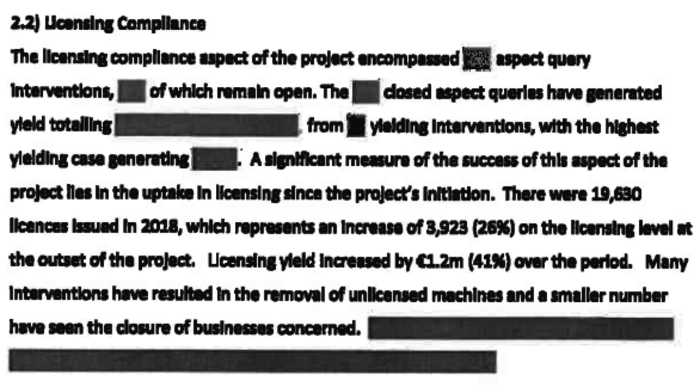 Partially-redacted Revenue documents
Partially-redacted Revenue documents
Licence numbers were up more than 25% since the start of the scheme, although this effectively confirms that a large number of machines were previously being used illegally.
“Many interventions have resulted in the removal of unlicensed machines and a smaller number have seen the closure of businesses concerned,” the Revenue documents said.
Dick Roche, a former Fianna Fáil minister who has lobbied on behalf of the LGAI, said the authorities had been hamstrung by archaic legislation which was difficult to enforce.
The situation at the moment is that the 1956 Act is so out of date that it is being flagrantly broken. Until the Revenue Commissioners started their operations two years ago, really nothing had been happening,” he said.
Hiding in plain sight
Despite the Revenue crackdown, gaming halls and casinos continue to operate in open breach of gaming laws.
During a series of visits to gaming venues early this month, Noteworthy observed thousands of slot machines still in use at casinos around Dublin, where the local authority’s 1988 decision prevents gaming licences being authorised.
At Dr Quirkey’s Good Time Emporium on O’Connell St, the city centre’s largest casino and amusement arcade, hundreds of machines were in operation either bearing no licences or recently expired amusement machine licences.
These licences, which cost around a quarter the fee for an annual gaming machine licence, are supposed to apply only to machines that give the player no more than the opportunity to play again for free or win a small, non-cash prize.
Several of these same machines advertised jackpots in the hundreds or thousands of euro, while other slot machines in the venue that bore no licences claimed to accept €500 notes and offer potential prizes of up to €7,000.
At the nearby Emerald Casino on Eden Quay, around 50 machines were in use, many bearing printed labels that read “money back amusement games” however some of the same machines also offered winning combinations worth in the thousands of euro.
Neither venue responded to requests for comment. However these are just two examples of Dublin gaming operators’ approached in the face of the effective licensing ban, as none of the machines observed in any city centre venues were in use with the correct permits displayed.
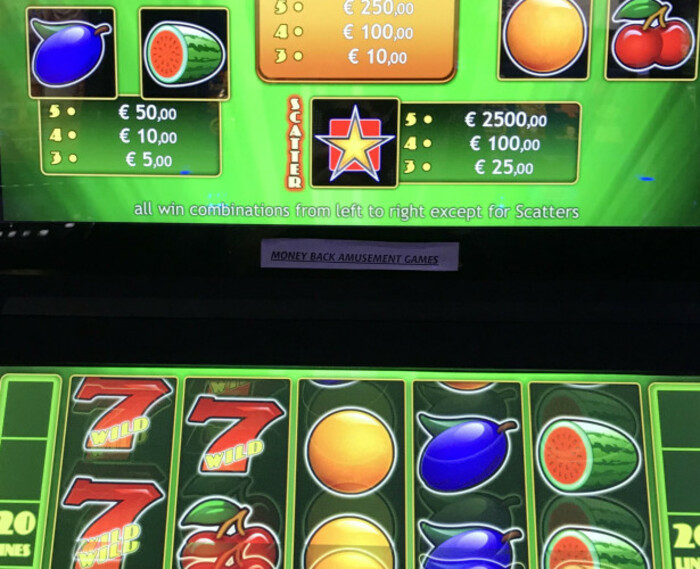 A machine with the label 'money back amusement games'
A machine with the label 'money back amusement games'
In addition to investigating how gaming venues were complying with licensing regulations, Noteworthy also looked at the steps operators were taking to prevent underage gambling in some of the country’s busiest pedestrian areas.
Players must be aged at least 16 to gamble in Ireland under existing laws, although casinos routinely claim to enforce tougher restrictions – limiting entry and gaming to only those aged over 18 or 21, depending on the venue.
Nevertheless, a 14-year-old boy, sent into several Dublin venues by this publication, was able to play a slot machine for nearly 10 minutes before he was asked for identification at Dr Quirkey’s arcade on O’Connell St.
The venue features little separation between the child-friendly amusement machines and casino operation except for a small sign stating that entry was barred for under-18s.
The same teen was immediately stopped on entry at one other premises in the area, while he was turned away from several more before placing a bet.
Even in areas outside Dublin where gaming is legal, operators still routinely break the limits set for stakes and winnings.
In Bray, where gaming was approved more than 60 years ago, all the local casinos and amusement arcades visited by Noteworthy offered jackpots in excess of €1,000 – 2,000 times the permitted sum – on some machines.
In other cases, machines required minimum bets of €1 or more, above the regulated limit. Industry figures, several of whom declined to be interviewed on the record, have argued that the laws are so outdated as to make compliance impossible.
An Garda Siochána, which investigates breaches of gaming laws surrounding stake and prize limits, did not respond directly to questions on how gaming operators were able to continue business in disregard of the regulations.
Only 13 breaches of the Gaming and Lotteries Act were recorded in 2017, the most recent year for which figures are available, down from 96 in 2010.
These figures include a range of offences – such as unauthorised lottery ticket sales – and it is not known how many relate to the operation of gaming machines, although gardaí have previously pursued venues like pubs and bookmakers for running illegal machines.
Independent senator David Norris, who has been outspoken about the problems surrounding the slot machine sector, said the laws should still be properly enforced even if the regulations needed to be updated and strengthened.
If people are playing these machines for fun, then small stakes are fine. What’s the point of having a law there if it’s not policed?” he said.
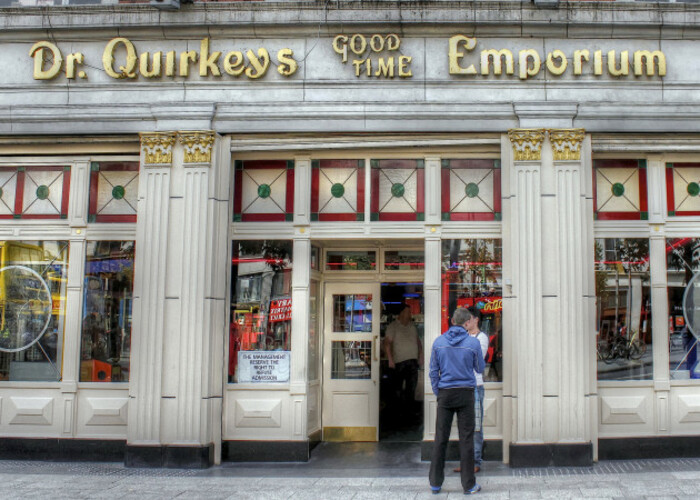 Dr Quirkey's Good Time Emporium on O'Connell St
Dr Quirkey's Good Time Emporium on O'Connell St
Gaming’s day in court
Following the Revenue crackdown, a number of Dublin operators applied to the district court for gaming licences in an apparent challenge to the four Dublin councils’ bans.
Only certain sites in the Fingal County Council-administered areas of Balbriggan and Skerries are currently open to gaming licences.
The applicants included many high-profile operators, including Expo Casino, which runs 24-hour gaming businesses at shopping centres in Tallaght and Santry, and Dr Quirkey’s, which is owned by retired garda and millionaire Richard Quirke.
However the judge, Michael Coghlan, refused the applications in February on the basis of the local authority decisions, noting that the businesses had “traded for some considerable period and without controversy until recently” in his ruling.
The operators, which also include several Dublin-based private members clubs, have appealed the decision to the circuit court.
They are arguing that the 1956 laws allowing local authorities to introduce selective gaming bans were anti-competitive and had been rendered illegal under EU rules.
Meanwhile, the Irish Amusement Trades Association (IATA), which represents both licensed and unlicensed gaming operators, has said it is going to the High Court to challenge the validity of the existing laws.
General secretary John Roche said the group believed the regulations that enabled local authorities to ban operators from some parts of the country went against recent European court rulings and were unconstitutional.
He declined to comment on unlicensed operators continuing to deploy slot machines or breaking existing rules around stakes and prizes.
The Gaming and Leisure Association of Ireland (GLAI), which represents private members clubs, has also argued any attempt to shut down its venues based on the 1956 laws would be unconstitutional.
Nevertheless, private members clubs – some of which require only ID and a sign-up form to be completed on the spot in order to join – still require gaming machine licences for any slot machines in their venues, bringing them under the remit of Revenue’s probe.
GLAI director David Hickson, who runs Dublin’s Fitzwilliam Card Club, which does not have slot machines, said it was a matter for individual clubs to decide whether they should provide gaming machines “based on the rules and the law as they have advice on it in their local area”.
The whole situation is unsatisfactory both from an operators’ point of view and a customer protection point of view, and we would support regulation and clarity on the whole subject matter,” he said.
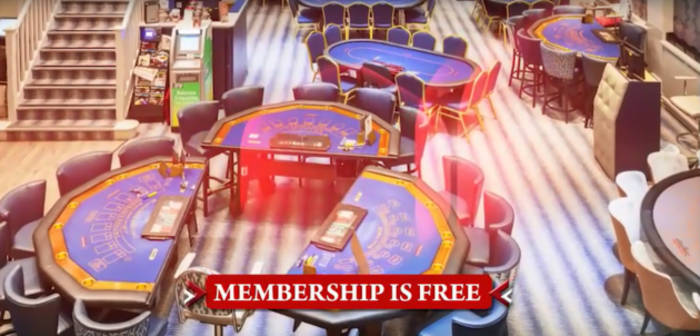 A TV ad for the Fitzwilliam Card Club
A TV ad for the Fitzwilliam Card Club
The need for regulation
There have been several attempts to overhaul the outdated gambling laws during a period of more than a decade.
In 2013, then justice minister Alan Shatter brought forward a general scheme for a Gambling Control Bill, which sought to introduce a new regulator and licences for all forms of gambling.
The regulator would also be charged with setting stake and prize limits and overseeing a central exclusion register for all punters who had barred themselves from licensed gambling operators.
However for several years these laws languished in the pre-draft stage before being handed to Minister of State David Stanton. In mid-2016, he told the Dáil that he wanted to bring in the new laws “at the earliest feasible opportunity”.
During meetings of various government agencies last year to discuss the provisions, one Department of Justice official noted that ”the regulation of gaming machines is legally fraught”.
According to minutes from the meetings, obtained by Noteworthy, the proposed gambling regulator would be charged with dictating the locations and numbers of permitted machines.
Local authorities were expected to relinquish the power to ban gaming in specific areas.
At one meeting, Stanton quoted estimates that there may be up to 40,000 illegal gaming machines in the State, although a later discussion document for the group noted there was “little information as to how many unlicensed/improperly licensed machines may be in operation”.
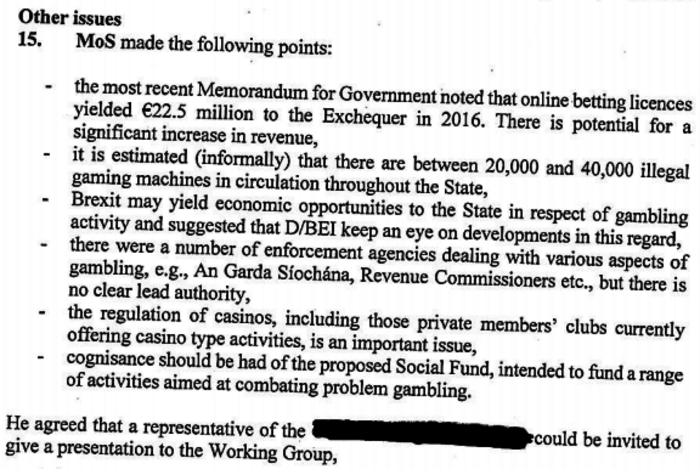 Records from last year's meetings on gambling reform
Records from last year's meetings on gambling reform
Private members clubs were also likely to be subject to new ‘casino’ licences, which could include scope to tie gaming machine numbers to the quantity of live gaming tables in each premises.
It was also suggested that properly gaming machines might be linked to ‘player cards’ – rather than cash – that could carry daily, weekly or monthly spending limits.
Machines could potentially be set up for ‘interrogation’ by authorities to make sure that licensing conditions weren’t broken.
A stop-gap
As a stop-gap measure, Stanton earlier this year proposed an amendment to existing regulations that would set new bet and prize limits among other changes.
These, controversially, would lift the maximum stake per game in a licensed venue to €10 for each player.
Maximum winnings would be increased to €750 per game, although the minister would have the power to change the limits in the future. The minimum age to gamble would be increased to 18.
Many gaming outfits, including industry group the GLAI, have opposed the changes, primarily on the grounds that the €10 maximum stake is unnecessarily and dangerously high, putting them unexpectedly on the same side of the debate as gambling addiction services.
The new limit represents a more than 300-fold increase on the current 3c maximum stake.
Several TDs also raised concerns about the large sums that could potentially be legally won and lost on slot machines when the amendment was considered at an Oireachtas committee last week.
Stanton told the meeting that the amendments were an “interim reform measure” while work continued on a full overhaul of gambling licensing and regulation.
I have seen people in arcades sitting with bags of coins just feeding the machines all day. If someone has an issue with gambling, you could argue that whether it’s €2 at a time or €10 at a time they’ll keep going until the bag of money has gone,” he said.
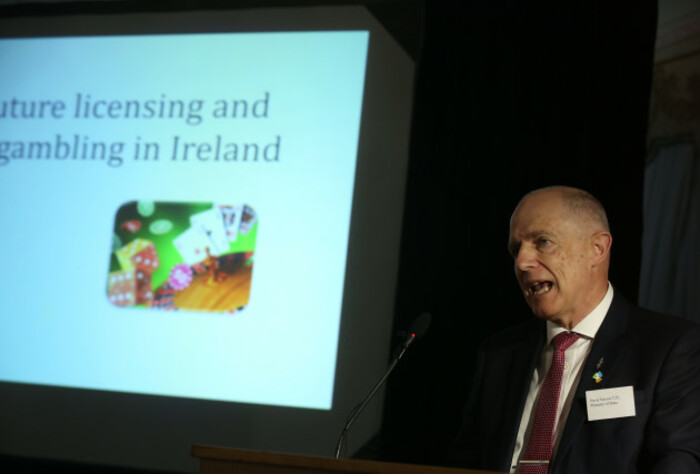 Minister of State David Stanton
Minister of State David Stanton
Meanwhile, all those with an interest in the industry agree that the long-awaited complete rewrite of the gambling laws is desperately needed – although Fianna Fáil’s Chambers doesn’t believe legislation will emerge during the life of the current Dáil.
Stanton said it was hoped the heads of a comprehensive Gambling Control Bill would be completed by mid-next year, while the government has previously admitted the new gambling regulator would not be in place until at least September 2020.
He added that enforcement of the rules was a matter for the relevant authorities and he wanted to see only licensed gaming machines operating in licensed arcades within areas where councils had approved the activity.
Full-scale enforcement of the existing rules including those surrounding bet limits would, however, put authorities on a collision course with virtually every gaming operator in the country as they face potential closure.
Norris said he had little concern for casino or amusement arcade owners that may be put out of business if the existing laws were properly enforced.
“My sympathy is for the people I see as the victims, and I think there are quite a large number of those. These are people who lose everything; people losing their houses, families splitting up – it needs to be addressed.”
- With reporting from Harry Wilcox
Know more about this story or want to share your experiences? Email the author via [email protected] or send a message using the secure Threema app, ID: ESUCBYMK
For more about how to support Noteworthy’s work, visit our website.


